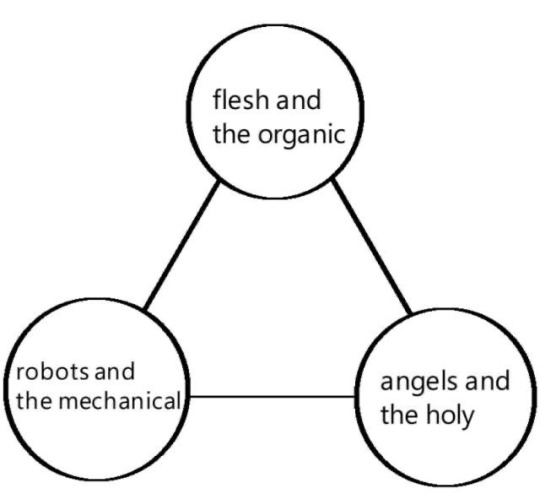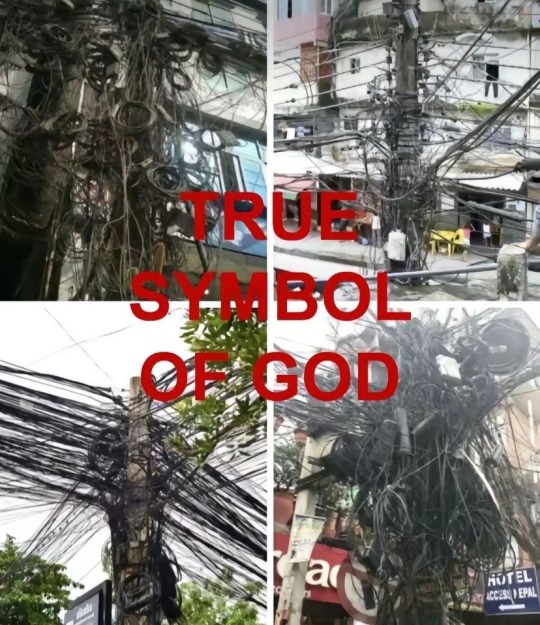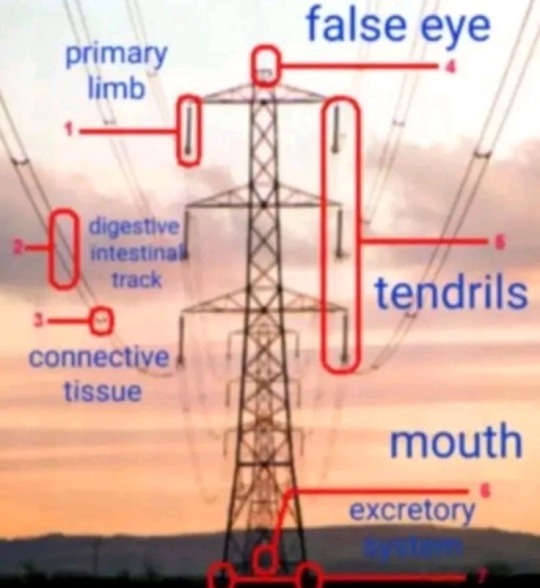#technology theory
Explore tagged Tumblr posts
Text
I never got a smartphone, and some days are rough. I can't use a lot of apps that are only available through smartphones, I can't do some convenient things. and I keep misplacing my dumb phone when I need to do phone verification for a few things. I definitely feel like a cranky old anti-tech person, which is ironic since I have a background in technology theory and ethics (so I know what it does to me). I'm also so scared that such a device can be so easily stolen, hacked, or otherwise compromised, and I would not be able to live with that level of stress constantly. I knew it would suck my attention and soul away like nothing else. And I still manage to spend too much time online thanks to wifi. So I've been actively limiting how I access social media, and it's helped my brain so much. The cyborging / extended mind is super easy to slip into (see: Andy Clark and extended mind theory). And there are some great things that come of this phenomenon, but it's also insidious when the end result is about distraction, hypersocializing, and never giving our brains time to rest. (Also see: The Anxious Generation by Jonathan Haidt) Between the data/privacy issues and how it's rewiring your brain, it's a really good idea to try to do a reset and reflect on what you are using your smartphone for and make deliberate choices about how you use it going forward.
I know millennials are getting the traditional generational luddite reputation at this point for sneering at smart devices and banging on about privacy and not needing all those fancy functions etc. but I am speaking to you right now as an experienced activist: you have to start seeing your smartphone as your big red glowing weak point. it is a repository of all the information someone could conceivably use to ruin your life, and you carry it around with you all day every day guarded by maybe a 6 digit PIN (or a photo of your face, seriously turn off face unlock right fucking now).
#technology#tech use#smartphones#privacy#data#smartphones and data#technology theory#cyborg theory#extended mind#andy clark#the anxious generation#jonathan haidt#activism#effective activism#social media#deliberate technology usage#cognition
14K notes
·
View notes
Text
What draws me to quantum theory is not only the science itself, but precisely this – the way it alters the very conditions through which we perceive, construct, and navigate knowledge. It proposes a model of the world in which uncertainty is not a flaw, but a feature. It replaces fixed truths with shifting relationships and invites a way of thinking that allows for ambiguity, context and indeterminacy. I must admit, I find this difficult. The absence of stable meaning, the refusal of clear conclusions, is something I’ve had to learn to sit with. At times, I resist it. But engaging with that discomfort has been one of the most generative parts of my curatorial work. Learning to inhabit that discomfort may also have cultivated a kind of responsiveness, an ability to sit with multiplicity, that feels increasingly necessary in a complex world. It has also allowed for exhibitions and conversations to emerge that wouldn’t have been possible without that intellectual tension.
267 notes
·
View notes
Text
What’s a “public internet?”

I'm in the home stretch of my 24-city book tour for my new novel PICKS AND SHOVELS. Catch me in LONDON (July 1) with TRASHFUTURE'S RILEY QUINN and then a big finish in MANCHESTER on July 2.

The "Eurostack" is a (long overdue) project to publicly fund a European "stack" of technology that is independent from American Big Tech (as well as other powers' technology that has less hold in Europe, such as Chinese and Russian tech):
https://www.euro-stack.info/
But "technological soveriegnty" is a slippery and easily abused concept. Policies like "national firewalls" and "data localization" (where data on a country's population need to be kept on onshore servers) can be a means to different ends. Data localization is important if you want to keep an American company from funneling every digital fact about everyone in your country to the NSA. But it's also a way to make sure that your secret police can lay hands on population-scale data about anyone they might want to kidnap and torture:
https://doctorow.medium.com/theyre-still-trying-to-ban-cryptography-33aa668dc602
At its worst, "technological sovereignty" is a path to a shattered internet with a million dysfunctional borders that serve as checkpoints where thuggish customs inspectors can stop you from availing yourself of privacy-preserving technology and prevent you from communicating with exiled dissidents and diasporas.
But at its best, "technological sovereignty" is a way to create world-girding technology that can act as an impartial substrate on which all manner of domestic and international activities can play out, from a group of friends organizing a games night, to scientists organizing a symposium, to international volunteer corps organizing aid after a flood.
In other words, "technological sovereignty" can be a way to create a public internet that the whole public controls – not just governments, but also people, individuals who can exercise their own technological self-determination, controlling crucial aspects of their own technology usage, like "who will see this thing I'm saying?" and "whose communications will I see, and which ones can I block?"
A "public internet" isn't the same thing as "an internet that is operated by your government," but you can't get a public internet without government involvement, including funding, regulation, oversight and direct contributions.
Here's an example of different ways that governments can involve themselves in the management of one part of the internet, and the different ways in which this will create more or less "public" internet services: fiber optic lines.
Fiber is the platinum standard for internet service delivery. Nothing else comes even close to it. A plastic tube under the road that is stuffed with fiber optic strands can deliver billions of times more data than copper wires or any form of wireless, including satellite constellations like Starlink:
https://pluralistic.net/2021/03/30/fight-for-44/#slowpokes
(Starlink is the most antifuturistic technology imaginable – a vision of a global internet that gets slower and less reliable as more people sign up for it. It makes the dotcom joke of "we lose money on every sale but make it up in volume" look positively bankable.)
The private sector cannot deliver fiber. There's no economical way for a private entity to secure the rights of way to tear up every street in every city, to run wires into every basement or roof, to put poles on every street corner. Same goes for getting the rights of way to string fiber between city limits across unincorporated county land, or across the long hauls that cross national and provincial or state borders.
Fiber itself is cheap like borscht – it's literally made out of sand – but clearing the thicket of property rights and political boundaries needed to get wire everywhere is a feat that can only be accomplished through government intervention.
Fiber's opponents rarely acknowledge this. They claim, instead, that the physical act of stringing wires through space is somehow transcendentally hard, despite the fact that we've been doing this with phone lines and power cables for more than a century, through the busiest, densest cities and across the loneliest stretches of farmland. Wiring up a country is not the lost art of a fallen civilization, like building pyramids without power-tools or embalming pharoahs. It's something that even the poorest counties in America can manage, bringing fiber across forbidden mountain passes on the back of a mule named "Ole Bub":
https://www.newyorker.com/tech/annals-of-technology/the-one-traffic-light-town-with-some-of-the-fastest-internet-in-the-us
When governments apply themselves to fiber provision, you get fiber. Don't take my word for it – ask Utah, a bastion of conservative, small-government orthodoxy, where 21 cities now have blazing fast 10gb internet service thanks to a public initiative called (appropriately enough) "Utopia":
https://pluralistic.net/2024/05/16/symmetrical-10gb-for-119/#utopia
So government have to be involved in fiber, but how should they involve themselves in it? One model – the worst one – is for the government to intervene on behalf of a single company, creating the rights of way for that company to lay fiber in the ground or string it from poles. The company then owns the network, even though the fiber and the poles were the cheapest part of the system, worth an unmeasurably infinitesimal fraction of the value of all those rights of way.
In the worst of the worst, the company that owns this network can do anything they want with its fiber. They can deny coverage to customers, or charge thousands of dollars to connect each new homes to the system. They can gouge on monthly costs, starve their customer service departments or replace them with mindless AI chatbots. They can skimp on maintenance and keep you waiting for days or weeks when your internet goes out. They can lard your bill with junk fees, or force you to accept pointless services like landlines and cable TV as a condition of getting the internet.
They can also play favorites with local businesses: maybe they give great service to every Domino's pizza place at knock-down rates, and make up for it by charging extra to independent pizza parlors that want to accept internet orders and stream big sports matches on the TV over the bar.
They can violate Net Neutrality, slowing down your connection to sites unless their owners agree to pay bribes for "premium carriage." They can censor your internet any way they see fit. Remember, corporations – unlike governments – are not bound by the First Amendment, which means that when a corporation is your ISP, they can censor anything they feel like:
https://pluralistic.net/2022/12/15/useful-idiotsuseful-idiots/#unrequited-love
Governments can improve on this situation by regulating a monopoly fiber company. They can require the company to assume a "universal service" mandate, meaning they must connect any home or business that wants it at a set rate. Governments can ban junk fees, set minimum standards for customer service and repair turnarounds, and demand neutral carriage. All of this can improve things, though its a lot of work to administer, and the city government may lack the resources and technical expertise to investigate every claim of corporate malfeasance, and to perform the technical analysis to evaluate corporate excuses for slow connections and bungled repairs.
That's the worst model: governments clear the way for a private monopolist to set up your internet, offering them a literally priceless subsidy in the form of rights of way, and then, maybe, try to keep them honest.
Here's the other extreme: the government puts in the fiber itself, running conduit under all the streets (either with its own crews or with contract crews) and threading a fiber optic through a wall of your choice, terminating it with a box you can plug your wifi router into. The government builds a data-center with all the necessary switches for providing service to you and your neighbors, and hires people to offer you internet service at a reasonable price and with reasonable service guarantees.
This is a pretty good model! Over 750 towns and cities ��� mostly conservative towns in red states – have this model, and they're almost the only people in America who consistently describe themselves as happy with their internet service:
https://ilsr.org/articles/municipal-broadband-skyrocket-as-alternative-to-private-models/
(They are joined in their satisfaction by a smattering of towns served by companies like Ting, who bought out local cable companies and used their rights of way to bring fiber to households.)
This is a model that works very well, but can fail very badly. Municipal governments can be pretty darned kooky, as five years of MAGA takeovers of school boards, library boards and town councils have shown, to say nothing of wildly corrupt big-city monsters like Eric Adams (ten quintillion congratulations to Zohran Mamdani!). If there's one thing I've learned from the brilliant No Gods No Mayors podcast, it's that mayors are the weirdest people alive:
https://www.patreon.com/collection/869728?view=condensed
Remember: Sarah Palin got her start in politics as mayor of Wasilla, Alaska. Do you want to have to rely on Sarah Palin for your internet service?
https://www.patreon.com/posts/119567308?collection=869728
How about Rob Ford? Do you want the crack mayor answering your tech support calls? I didn't think so:
https://www.patreon.com/posts/rob-ford-part-1-111985831
But that's OK! A public fiber network doesn't have to be one in which the government is your only choice for ISP. In addition to laying fiber and building a data-center and operating a municipal ISP, governments can also do something called "essential facilities sharing":
https://transition.fcc.gov/Bureaus/Common_Carrier/Orders/1999/fcc99238.pdf
Governments all over the world did this in the late 1990s and early 2000s, and some do it still. Under an essential facilities system, the big phone company (BT in the UK, Bell in Canada, AT&T and the Baby Bells in the USA) were required to rent space to their competitors in their data centers. Anyone who wants to set up an ISP can install their own switching gear at a telephone company central office and provide service to any business or household in the country.
If the government lays fiber in your town, they can both operate a municipal fiber ISP and allow anyone else to set up their own ISP, renting them shelf-space at the data-center. That means that the town college can offer internet to all its faculty and students (not just the ones who live in campus housing), and your co-op can offer internet service to its members. Small businesses can offer specialized internet, and so can informal groups of friends. So can big companies. In this model, everyone is guaranteed both the right to get internet access and the right to provide internet access. It's a great system, and it means that when Mayor Sarah Palin decides to cut off your internet, you don't need to sue the city – you can just sign up with someone else, over the same fiber lines.
That's where essential facilities sharing starts, but that's not where it needs to stop. When the government puts conduit (plastic tubes) in the ground for fiber, they can leave space for more fiber to fished through, and rent space in the conduit itself. That means that an ISP that wants to set up its own data center can run physically separate lines to its subscribers. It means that a university can do a point-to-point connection between a remote scientific instrument like a radio telescope and the campus data-center. A business can run its own lines between branch offices, and a movie studio can run dedicated lines from remote sound-stages to the edit suites at its main facility.
This is a truly public internet service – one where there is a publicly owned ISP, but also where public infrastructure allows for lots of different kinds of entities to provide internet access. It's insulated from the risks of getting your tech support from city hall, but it also allows good local governments to provide best-in-class service to everyone in town, something that local governments have a pretty great track record with.
The Eurostack project isn't necessarily about fiber, though. Right now, Europeans are thinking about technological sovereignty through the lens of software and services. That's fair enough, though it does require some rethinking of the global fiber system, which has been designed so that the US government can spy on and disconnect every other country in the world:
https://pluralistic.net/2023/10/10/weaponized-interdependence/#the-other-swifties
Just as with the example of fiber, there are a lot of ways the EU and member states could achieve "technological sovereignty." They could just procure data-centers, server software, and the operation of social media, cloud hosting, mobile OSes, office software, and other components of Europeans' digital lives from the private sector – sort of like asking a commercial operator to run your town's internet service.
The EU has pretty advanced procurement rules, designed to allow European governments to buy from the private sector while minimizing corruption and kickbacks. For example, there's a rule that the lowest priced bid that conforms to all standards needs to win the contract. This sounds good (and it is, in many cases) but it's how Newag keeps selling trains in Poland, even after they were caught boobytrapping their trains so they would immobilize themselves if the operator took them for independent maintanance:
https://media.ccc.de/v/38c3-we-ve-not-been-trained-for-this-life-after-the-newag-drm-disclosure
The EU doesn't have to use public-private partnerships to build the Eurostack. They could do it all themselves. The EU and/or member states could operate public data centers. They could develop their own social media platforms, mobile OSes, and apps. They could be the equivalent of the municipal ISP that offers fast fiber to everyone in town.
As with public monopoly ISPs, this is a system that works well, but fails badly. If you think Elon Musk is a shitty social media boss, wait'll you see the content moderation policies of Viktor Orban – or Emmanuel Macron:
https://jacobin.com/2025/06/france-solidarity-urgence-palestine-repression
Publicly owned data centers could be great, but also, remember that EU governments have never given up on their project of killing working encryption so that their security services can spy on everyone. Austria's doing it right now!
https://www.yahoo.com/news/austrian-government-agrees-plan-allow-150831232.html
Ever since Snowden, EU governments have talked a good line about the importance of digital privacy. Remember Angela Merkel's high dudgeon about how her girlhood in the GDR gave her a special horror of NSA surveillance?
https://www.bbc.com/news/world-us-canada-24647268
Apparently, Merkel managed to get over her horror of mass surveillance and back total, unaccountable, continuous digital surveillance over all of Germany:
https://www.hrw.org/news/2021/06/24/germanys-new-surveillance-laws-raise-privacy-concerns
So there's good reasons to worry about having your data – and your apps – hosted in an EU cloud.
To create a European public internet, it's neither necessary nor desirable to have your digital life operated by the EU and its member states, nor by its private contractors. Instead, the EU could make Eurostack a provider of technological public goods.
For example, the EU could work to improve federated social media systems, like Mastodon and Bluesky. EU coders could contribute to the server and client software for both. They could participate in future versions of the standard. They could provide maintenance code in response to bug reports, and administer bug bounties. They could create tooling for server administrators, including moderation tools, both for Mastodon and for Bluesky, whose "composable moderation" system allows users to have the final say over their moderation choices. The EU could perform and/or fund labelling work to help with moderation.
The EU could also provide tooling to help server administrators stand up their own independent Mastodon and Bluesky servers. Bluesky needs a lot of work on this, still. Bluesky's CTO has got a critical piece of server infrastructure to run on a Raspberry Pi for a few euros per month:
https://justingarrison.com/blog/2024-12-02-run-a-bluesky-pds-from-home/
Previously, this required a whole data center and cost millions to operate, so this is great. But this now needs to be systematized, so that would-be Bluesky administrators can download a package and quickly replicate the feat.
Ultimately, the choice of Mastodon or Bluesky shouldn't matter all that much to Europeans. These standards can and should evolve to the point where everyone on Bluesky can talk to everyone on Mastodon and vice-versa, and where you can easily move your account from one server to another, or one service to another. The EU already oversees systems for account porting and roaming on mobile networks – they can contribute to the technical hurdles that need to be overcome to bring this to social media:
https://pluralistic.net/2024/12/14/fire-exits/#graceful-failure-modes
In addition to improving federated social media, the EU and its member states can and should host their own servers, both for their own official accounts and for public use. Giving the public a digital home is great, especially if anyone who chafes at the public system's rules can hop onto a server run by a co-op, a friend group, a small business or a giant corporation with just a couple clicks, without losing any of their data or connections.
This is essential facilities sharing for services. Combine it with public data centers and tooling for migrating servers from and to the public server to a private, or nonprofit, or co-op data-center, and you've got the equivalent of publicly available conduit, data-centers, and fiber.
In addition to providing code, services and hardware, the EU can continue to provide regulation to facilitate the public internet. They can expand the very limited interoperability mandates in the Digital Markets Act, forcing legacy social media companies like Meta and Twitter to stand up APIs so that when a European quits their service for new, federated media, they can stay in touch with the friends they left behind (think of it as Schengen for social media, with guaranteed free movement):
https://www.eff.org/interoperablefacebook
With the Digital Service Act, the EU has done a lot of work to protect Europeans from fraud, harassment and other online horribles. But a public internet also requires protections for service providers – safe harbors and carve outs that allow you to host your community's data and conversations without being dragged into controversies when your users get into flamewars with each other. If we make the people who run servers liable for their users' bad speech acts, then the only entities that will be able to afford the lawyers and compliance personnel will be giant American tech companies run by billionaires like Elon Musk and Mark Zuckerberg.
https://pluralistic.net/2020/12/04/kawaski-trawick/#230
A "public internet" isn't an internet that's run by the government: it's a system of publicly subsidized, publicly managed public goods that are designed to allow everyone to participate in both using and providing internet services. The Eurostack is a brilliant idea whose time arrived a decade ago. Digital sovereignty projects are among the most important responses to Trumpism, a necessary step to build an independent digital nervous system the rest of the world can use to treat the USA as damage and route around it. We can't afford to have "digital soveriegnty" be "national firewalls 2.0" – we need a public internet, not 200+ national internets.

If you'd like an essay-formatted version of this post to read or share, here's a link to it on pluralistic.net, my surveillance-free, ad-free, tracker-free blog:
https://pluralistic.net/2025/06/25/eurostack/#viktor-orbans-isp
#pluralistic#web theory#public ownership#infrastructure#technology#eurostack#technological soveriegnty#first amendment#utilities#1a
201 notes
·
View notes
Text





we are corrupted with the mark of the beast. we shall perish for submission to the beast
“And it was given unto him [the false prophet] to give breath to it […], that the image of the beast [Satan] should both speak, and cause that as many as should not worship the image of the beast should be killed. And he causeth all, the small and the great, and the rich and the poor, and the free and the bond, that there be given them a mark on their right hand, or upon their forehead; and that no man should be able to buy or to sell, save he that hath the mark, [even] the name of the beast or the number of his name. Here is wisdom. He that hath understanding, let him count the number of the beast; for it is the number of a man: and his number is Six hundred and sixty and six.” Revelation 13:15-18
“And the smoke of their torment will rise for ever and ever. There will be no rest day or night for those who worship the beast and its image, or for anyone who receives the mark of its name.” Revelation 14:11
#schizoposting#transcendentalism#transhumanism#cyber#cybercore#cyberpunk#religion#technology#techcore#digitalism#spirituality#masonry#free masons#consciousness#ego death#saturn#666 satan#illuminati#god#god is light#ashtar sheran#cosmic entity#extraterrestial life#futuristic#futurism#conspiracy theories#conspiracies#conspiracy theory#satan is real#mark of the beast
204 notes
·
View notes
Text
In the twentieth century, few would have ever defined a truck driver as a ‘cognitive worker’, an intellectual. In the early twenty-first, however, the application of artificial intelligence (AI) in self-driving vehicles, among other artefacts, has changed the perception of manual skills such as driving, revealing how the most valuable component of work in general has never been just manual, but has always been cognitive and cooperative as well. Thanks to AI research – we must acknowledge it – truck drivers have reached the pantheon of intelligentsia. It is a paradox – a bitter political revelation – that the most zealous development of automation has shown how much ‘intelligence’ is expressed by activities and jobs that are usually deemed manual and unskilled, an aspect that has often been neglected by labour organisation as much as critical theory.
– Matteo Pasquinelli, The Eye of the Master: A Social History of Artificial Intelligence (2023)
#Matteo Pasquinelli#The Eye of the Master#Social History#Social theory#AI#Artificial Intelligence#Science#Scientism#Labour#Capitalism#Marxism#Malaise#Computer Science#Technology#Words#Quote#Writing#Text#Reading#Books#⏳
162 notes
·
View notes
Quote
You have a choice: pursue your dreams, or be hired by someone else to help them fulfill their dreams.
Jay Samit, Disrupt You!: Master Personal Transformation, Seize Opportunity, and Thrive in the Era of Endless Innovation
#quotes#Jay Samit#Disrupt You!: Master Personal Transformation#Seize Opportunity#and Thrive in the Era of Endless Innovation#thepersonalwords#literature#life quotes#prose#lit#spilled ink#business-quotes#change#change-your-life#disruption#disruptive-innovation#disruptive-technology#entrepreneur#entrepreneurial#entrepreneurship#innovation#insightful#inspirational#management#management-and-leadership#management-theory#motivational#self-help#self-improvement#social-media
99 notes
·
View notes
Text

#Walter Russell#light#energy#waves#consciousness#science#technology#holographic universe#simulation theory#simulated reality#simulated universe#manifesting#mathematics#quantum physics#quantum mechanics#quantum jumping#quantum leap#magic#ascension#enlightenment#the matrix#wave#nature#sacred geometry#fibonacci sequence#fibonacci spiral#golden ratio#art
129 notes
·
View notes
Text


What are people's take on this? The pyramids in the background seem to support the Sutekh theory or are they just mountains?. Triad = Pyramids. Sue's Tech = Sutekh ( a stretch, I know but the Osirans do have advanced tech to rival the time lords). Maybe Susan is a (unwitting) servant of Sutekh like this guy in Pyramid of Mars whose face we never saw:

Looking at the promo pictures, it struck me how similar this image is to Sutekh's time corridor:


Additionally, we see this sand/dust cloud in the trailer. Sutekh wanted to turn all existence to dust:


We know an ancient evil will be awoken from within UNIT using TRIAD technology. Sutekh has been trapped since ancient antiquity but almost escaped in 1911 from a time corridor in UNIT's basement. but the Doctor forced him to age 7000s years, presumably killing him. But if not, he could certainly qualify as The One Who Waits.
We also know S Triad = TARDIS which seems to suggest time lord technology or something similar. If she used a prototype that went wrong, it could have scattered her across time without her knowing and she's experiencing her other lives as dreams.

We also have the matter of the Doctor's TARDIS acting strange, perhaps TRIAD Technology is siphoning energy or life from the Doctor's TARDIS In order to work
Additionally thoughts:
we have a new Tales of Tardis episode airing the day before the finale that will feature Ncuti Gatwa and Millie Gibson. I'm assuming they will be in the Memory Tardis, which we know feeds on stories. which could link to the tv show / unreality theory. Is the Memory Tardis Triad Tech? Maybe she is selling it as a commercial experience to relive memories but it's a Ghost Machine Doomsday situation and she doesn't truly know what she's messing with or that her dreams are actually happening irl as a side effect of using the tech.
Empire of Death- Sutekh is the god of death
Tom Baker is the only Doctor to not appear in Tales of the TARDIS, so the new episode will likely be a Fourth Doctor story. Pyramids of Mars is my bet but are there any credible ideas?
But how to reconcile this with the 'tv show in a tv show' theory and Ruby's parentage? And this is complicated by this claim from RTD that the finale will link back to the Pertwee era, suggesting someone like Omega? Or maybe Susan worked for UNIT back in the 70s and has been building the technology for 50 years andh as only now succeeded with the influence of TOWW.

Every clue seems to raise more questions. I'd love to get people's thoughts as I may be spiraling here.
One thing I am sure of? Susan Triad is not the one in control
#dw spoilers#dw theory#doctor who spoilers#doctor who meta#dw meta#Susan Triad#Susan Twist#sutekh the destroyer#Doctor Who speculation#dw speculation#The One Who Waits#Empire of Death#The Legend of Ruby Sunday#memory tardis#Triad Technology#Ruby Sunday#doctor who theory#doctor who finale#spoilers#theory#doctor who#dw#Tales of the Tardis#ToTT#Pyramids of Mars#Sutekh
382 notes
·
View notes
Text

Everyone keeps capping them like they’re so scary rn but i think they look so intrigued like abby just showed them a nintendo ds for the first time 😭
#Fnaf#my game theory#also i scrempt at spring bonnie as usual#WAIT IM GOING TO DFAW THIS#her showing them mario kart like you would not believe the advancements of technology to these kids living in techno limbo
931 notes
·
View notes
Text
I dont wanna finshing one (1) animated panel for the comic but I do kinda wanna go a bit insane and re-animate a shot/scene from httyd, just because
#i mean#in theory I could do it#I have the knowlegde to do it#also the technology#tho I would so much rather do that on harmoney cause I love how doing clean up animation works there and i dont wanna do that on csp#but i could do it#dg rambles
45 notes
·
View notes
Text
It’s hard to talk about this without it sounding like a Mass Effect crossover (which is not what I’m suggesting), but I genuinely think that some/all of the evanuris have been to outer space.
Evidence:
A very straightforward interpretation of “the Void” is space. Like the only reason we don’t instantly think it’s space is because we’re in high fantasy.
Ditto for “Forgotten Ones”.
The astrarium sidequest encourages us to connect old gods with the stars.
Falon’Din walks the night, where the People cannot live, through “airless skies”.
He’s also associated with uthenera, aka cryosleep.
Some very alien monsters are now appearing in Thedas, and also in Ghilan’nain’s workshop(s), which seems to have some connection to the Blight (darkspawn and wardens are the ones being “treated”).
Where does the Blight come from? Oh yeah, that’s right, the Void. A place so hostile Andruil had to don armor of the Void to enter it. 🧑🚀
tl;dr the reason the elves lost control of the Blight is because it’s alien terraforming tech. Yes it can injure the titans; yes it may grant you power. But there will be a couple very unwanted side effects.
BTW I know not everyone is a huge fan of sci-fi crashing into fantasy stories, but I think it can be fun if everything is through the eyes of the fantasy characters. You get very poetic interpretations of what’s happening, which is a different angle than what you usually see in sci-fi. If this theory turns out to be true, I imagine everything will still be treated largely as magic, with the sci-fi elements remaining slightly ambiguous.
#dragon age#dragon age speculation#dragon age meta#dragon age headcanon#the evanuris#andruil#falon'din#tevinter nights#cekorax#dragon age theory#dragon age inquisition spoilers#dragon age spoilers#trespasser spoilers#dragon age trespasser#horrors of hormok#ghilan'nain#dragon age lore#also The Metaphor™️ of world-ending tech being tangled up with the technology to go to space#of rockets and death being part of the same god#it’s a common story because it’s our story#we didn’t find alien tech up there#but rockets can be used for lots of different things
181 notes
·
View notes
Text
(Catholics don’t do divine command theory, right, that’s some evangelicals? Do Catholics do the ‘God would not tell you to do something wrong, that is just not a thing that would happen’? Or something else?)
Anyway, wow Vincent is perfect for the kind of story of,
God tells Vincent to do something which is wrong. (Yes literally God in this one, I’m not sure what kind of story like that this is but it is).
Vincent: I acknowledge Your ownership of every part of me and that You can do as You will with me. I love and honor and bow to You. And I’m not going to do that.
(God: 💙)
(This is a test of Abraham type of thing where him actually doing the wrong thing was never an outcome that was going to happen or supposed to, but seeing what he would do if told to was.)
#I’m assuming none of this is how anything catholic would be but I’m going to think about it anyway because I want to#conclave#vincent benitez#conclave 2024#iw#blogger is not catholic#God#religion#god fearing#this needs some kind of warning tag#But I’m not sure what they would be…#Googled and never mind Catholics absolutely do divine command theory!#theology#ethics#philosophy#Thesaurusing for blank; why is it hard to find the exact words I want#Oh yeah capitals#Seriously how do I warning tag this#hierophilia#whah why does technology do things I don't want. *moves devices* oh nice ok it did save most of the updates actually#me: trying to sleep. me: has thought#I'm going to go hide somewhere now
22 notes
·
View notes
Text
before it felt like a sin, ch. 1

pairing: Sebastian Sallow x f!MC
word count: 3000
summary: Eloise never wanted to be different.
And yet, her differences are what have defined her life up until this point: growing up as a squib in one of the most prominent wizarding families, being exiled to muggle society, and then attending Hogwarts at the age of sixteen.
She finds herself thrust into the life she should have been prepared for from birth but was denied. As she navigates this new life and her new precarious position in her family, she must come to terms with the fact that maybe what she dreamed of her whole life isn't turning out how she ever expected it would.
a/n: Hi everyone!! I decided to post this here too...I'm slowly going through everything I've written so far, and I want to post each chapter here as I edit them. I'm hoping that this can be a way to a) get back in to writing more, and b) get better at my art as I make full illustrations for each chapter. Let me know what you think!! :)

There is nothing quite as horrible as being a muggle, Eloise thought savagely as she ripped out yet another stitch in the landscape she was embroidering. At least, it was supposed to be a landscape. Maybe with her head tilted to the left and with her eyes almost closed so everything blurred together, it might resemble one. She did just that, trying her hardest to make out some recognizable shape and blast the stupid practice of manually pushing colored thread through a fabric in some sort of -
“And what is this, Miss Babbit?”
Eloise jumped at the sound and looked up at the scowling face of her teacher, and then quickly back down at the tangled thread in her lap. Behind her, she could hear the hushed giggles of the other girls in her class.
“Oh! Er…it’s -”
“How long have you been here?” the woman interrupted.
“One hour…I just -”
“Don’t be smart with me. I mean, at this institute.”
“Five years.” Eloise glared down at her embroidery as if it had personally offended her. It wasn’t like she was actively trying to be bad at everything, but she had the distinct disadvantage - how had it ever come to be that she would be at a disadvantage to muggles? - of not having spent a lifetime being prepared for muggle society and all that it entailed. The last five years had been a monotonous, endless cycle of lessons designed to turn her into the perfect lady: French (a waste of time as Eloise was already fluent), embroidery (a waste of time as the things she embroidered weren’t actually useful), dancing (a waste of time as she was already engaged to be married - why would she bother trying to woo another silly man?), and her most dreaded class of all: etiquette. No matter how many years had been spent trying to assimilate into muggle culture, her thoughts still got muddled when she tried to remember the steps to a dance, or how to properly address the son of a duke.
Did it really matter, anyways, what the other girls thought? She had pretended her whole life to be the daughter she thought her parents had wanted - now she was simply pretending that she hadn’t been thrown into the muggle world without a second thought. What was a bit more pretending - that she didn’t care? That she hadn’t been tossed aside without a second thought?
“Exactly. Five years. And yet, you have shown no progress whatsoever. This -” a finger jabbed accusingly at the embroidery - “is absolutely horrendous. If your parents hadn’t continued to make such a sizeable donation every year, I would have deemed you a lost cause and sent you packing when you first arrived. How your family ever managed your betrothal to the son of an earl is beyond me.”
Eloise grimaced at the mention of her fiance as her teacher clapped her hands together to get the attention of the class - a wholly unnecessary action due to the fact that it was already being given. “Class is dismissed. Please collect your belongings and put them in the correct place. Remember, as future wives and mothers, you must be organized in all aspects of your life. Many of you will be managing important households and the slightest misstep -“ a slight glance to Eloise out of the corner of her eye - “can cause the biggest of scandals.”
Eloise raced to gather her things and leave the classroom before everyone else. No matter how many years had been spent at the school, she couldn’t help but hate sitting through the classes amongst the judgmental stares and snide remarks. Although things had started out shaky at the finishing school - to be expected, really, when you’ve grown up in wizarding society and then are then forced to live as a muggle - it still stung that after all these years, she still hadn’t found a friendly face. She was treated as if she were a pariah: it was as if the other girls just knew that something was different about her. But…wasn’t that the great irony of it all? She wasn’t different than them. She was a filthy squib.
When she first arrived at the school, she was an anomaly. A twelve-year-old girl who didn’t know how to play the piano or who the queen was. It was clear to everyone that Eloise wasn’t the charity case of the school - her parents were obviously quite wealthy - and yet they seemingly wanted nothing to do with her. Whereas the others got regular letters and visits from their family, it was as if Eloise were an orphan. Nothing new to her of course, but to her peers this otherness aided them in her ostracization.
Upon entering her room, she was abruptly pulled out of her thoughts. Something wasn’t right. Everything seemed the same: a twin bed perfectly made opposite a small wardrobe, a plain wooden desk placed between them. The weak afternoon sunlight shone through the window, illuminating her desk. But…there.
That…
Placed on her bed, resting on the pillow, was a letter.
She never received letters.
Eloise shoved her embroidery under her bed and hungrily grabbed at it, pausing when she saw the address. Miss E. Babbit. The Third Bedroom on the Left… It seemed vaguely familiar to her in a way she couldn’t quite put her finger on.
As she read the letter, though, it became apparent to her exactly why this was. Although not exactly the same as the one her brother had received six years earlier, it quickly became apparent that this was a Hogwarts letter. For her. For Miss E. Babbit.
Hands shaking, she set the letter down on her desk and sat on the edge of her bed. She smoothed her hands over her skirt over and over, taking comfort in the familiar softness as she tried to even her breathing.
How was this possible? She had all but accepted the fact that she was a squib. The shame of her family, a dirty secret to be hidden away and never talked about or mentioned again. Her parents had suspected as much by the time she had turned seven without any signs of magic whatsoever manifesting around her - not even a basic transformation of brussel sprouts to sweets during dinner. It was ultimately confirmed, however, when her own Hogwarts acceptance letter never arrived. She had spent the whole year before her banishment daydreaming about her life at Hogwarts, still optimistic that there could be something magical inside of her. Her brother, Leo, came home every holiday with wonderful stories of his new friends and teachers, and the subjects he was learning at school. Even back then, at twelve years old, Eloise hadn’t been sure if he was actually hopeful she wasn’t a squib, or if he had been trying to prolong the fantasy for her before it all came crashing down.
Although she had had five years to come to terms with her new life, there was still a small part of her that hoped. A small “what if…”. She had tried time and time again to squash that tiny ray of optimism that would escape every so often, tried so very hard to cultivate a hard exterior that wouldn’t let any sort of vulnerability shine through. And that optimism was a vulnerability, after all. It was that vulnerability that had made it absolutely impossible for her to fit in the muggle world, and made it so that she didn’t really want to try.
Five years to come to terms with the fact that she needed a new purpose for her life and…
…not anymore?
Eloise grabbed the letter and greedily read through it again, drinking in all of the words. She paused at the end, thinking. Was this a forgery? Some sort of awful joke orchestrated by her brother? Leo had never been cruel to her in the past; in fact, he was the one who always encouraged her and was the most probable source of the small optimism that remained within her. However, she had no way of knowing how he had changed since she had last seen him. It had been, after all, five very long years. And not once had she heard from him, even though he had promised her through huge sobbing gulps that he would never abandon her. Maybe their parents had slowly poisoned him against her. It would be right on the nose for them, after all.
Looking at the envelope again, however…Third Bedroom on the Left…no. It was too specific. Nobody in her previous life had any reason to even want to contact her again, and nobody in her current life even knew what Hogwarts was, let alone have the ability to convincingly forge a letter just to have some fun at her expense.
A light, bubbly feeling began to spread throughout her body as it sunk in that this was real. She was going to Hogwarts. Soon, a - squinting at the letter again - a Professor Fig would be contacting her and giving her things to study. A huge grin slowly spread across her face and she hugged the letter to her chest as she fell back on her bed. She read through it again. Was it the fifth time already? It felt as though no amount of times rereading the letter would ever be enough.
Eloise got up and walked over to look at the calendar on her desk. She was surprised to see that September 1st was in only two days. The days at the finishing school moved in such a strange, sluggish way. They all felt the same. Monotonous. French and Latin and embroidery and household management and Merlin even knows what else all blending into each other in an endless parade of dusty classrooms and gossip and boredom.
The light feeling left her in an instant as, after years of practice, the optimism was squashed back down. But how will you even get to London? And, her brain added sneakily, you haven’t even shown any signs of magic. Maybe you’ll just be returned back here after they realize their mistake.
No, she thought fiercely, gripping the letter. Until -
A tapping came from the window. A tentative smile returned at the sight of a tawny brown owl with another envelope in its beak. She ripped it open as soon as it was in her hands (again addressed to Miss E. Babbit) and along with the letter a small, purple pouch fell out of the envelope and onto her bed.
Miss Eloise Babbit,
I am pleased to be the wizard charged with such an important task as escorting you to Hogwarts in two days’ time. It is something extraordinary to be accepted in your fifth-year, and as such, I expect extraordinary things from you. I have enclosed a small pouch along with this envelope, and in it are some items that will be vital to you in the upcoming days. I have included books for you to study at your leisure, and a small gobstone that will bring you to our rendezvous point in London. All you have to do is touch it at noon on the 1st and you will be transported instantly.
Your family has not been informed of your acceptance. I am sure you understand why - at this, Eloise scoffed quietly to herself - which is why I will personally be your escort.
I am looking forward to meeting you and bringing you to the sorting ceremony in two days’ time.
Yours,
Eleazar Fig
The handwriting was tiny and spidery and cramped, but it didn’t stop Eloise from reading it with the same vigor as the previous letter and as many times. Finally, she turned to the small pouch that had fallen onto her bed when she opened the second envelope. It must have had an invisible extension charm, because it was filled to the brim with books on basic spellwork and general wizarding history. Professor Fig had no way of knowing, but Eloise had already read many of these books and many more during the year her brother had started Hogwarts, as she had needed to know absolutely everything about what would be awaiting her. A few years may have passed since she had stepped foot in her family’s library, but she couldn’t get the books or their contents out of her brain even if she had wanted to. She had really wanted to forget everything she knew about the magical world when it was confirmed she was a squib but it was a futile effort. As she zoned out during her piano lessons, she would find herself mentally going through the movements to cast different charms.
It was painful to be thinking about things from the life that had been ripped away from her, to know that what she was thinking about would never come to pass, that she would never be able to wield magic - and yet she couldn’t find herself able to stop.
As Eloise picked out one of the books and settled into her armchair, a steely resolve overcame her.
She would prove that she deserved to be there, and was just as capable as any of they were. She would make her parents regret ever discarding her like she was nothing.
She was worthy. She was capable. And she would prove it.

The morning of September 1st dawned cold and rainy. Absolutely perfect.
Eloise had pretended to be sick the night before, and no one had suspected a thing when she stayed in bed long after all of the other girls had gotten ready and headed to breakfast. As the last of the chattering faded away down the hallway, Eloise finally got out of bed and prepared herself for the day. It was difficult to sit still long enough to braid her hair. Her fingers wouldn’t stop trembling and she had to restart countless times. Finally, she tied the black ribbon at the end into a neat bow and turned to the drawer of her desk to retrieve the small purple pouch she had hidden away.
Everything she deemed important enough to come along with her had already been placed inside: the books from Professor Fig, the hair ribbons gifted to her by her brother many years ago, and some clothing. Nothing else was coming with. She needed the fresh start. Besides, anything else she might need would be supplied, as her acceptance letter had specifically stated that any school supplies would be provided to her.
Waiting the hours before noon came along proved to be more difficult than Eloise had imagined. Time seemed to be moving slower than the molasses that had come with the breakfast sent up to her, the steady patter of the rain becoming a sort of metronome keeping time as she paced back and forth. Wasn’t there anything that could distract her, even for a bit? She glanced at the clock. Only five minutes had passed since the last time. 10.35.
The second hand ticking away in tandem with the sound of rain splashing against her window.
What if this was all a trick? What if she arrived at Hogwarts, and they turned her away because they realized they had made a mistake? After all, why would they admit a sixteen-year-old? Surely she was too old; every other student had started Hogwarts at the age of twelve and had shown signs of magic much earlier than that. She still hadn’t shown any signs of magical capability whatsoever, and didn’t feel any different than she had before receiving the letter. It had to be a fluke.
As her thoughts started veering into the melancholy she was prone to, she shook her head. No. Today was a happy, exciting day. She wasn’t going to squash the optimism down today, not when she needed it most. All of these thoughts she was having were simply that: thoughts. Not reality. Hogwarts never made a mistake, and in all of the history books she had read, she couldn’t recall an instance of someone being turned away at the door. Granted, she had also never heard of someone being admitted so late. But, better to focus on what she did know, which was that she had gotten the letter. It must be right in its assumption that she had magic.
Trying to pass the time was easier said than done. She ended up quizzing herself on all of the charms she had memorized in the books sent by Professor Fig, moving an imaginary wand in the precise movements needed to successfully cast and focusing on her pronunciation. She had studied all of these forms late into both nights she had had the books, and when she would eventually close her eyes to sleep, the wand movements were all she saw.
Eloise was determined that she would receive pity from nobody. Nobody was going to look at her like she was lacking. She had gotten enough of that to last a lifetime, and now that she was given this opportunity she wasn’t about to waste it.
When noon finally struck, Eloise was ready and waiting. She eagerly grabbed the gobstone that was sitting on her desk and felt the familiar tugging sensation in her navel as she was whisked away to London and the beginning of her new life.
next chapter
#im just writing this fic for fun & since I’m editing it a bit#I thought it would be fun to challenge myself to do full illustrations for each chapter#(the reason I started these fanarts in the first place was for this🧍♀️)#if you actually read this I would love to know what you think!!#I keep going back & forth between wanting to make a master list and also explain my tag system on this tumblr#but at the same time I like the chaos…🤔#well let me know!! or if you have any suggestions!!💓😙#it starts off a bit slow but this story is VERY canon-divergent#and will have a lot of mythology/magical theory/pureblood society etc etc#i dont expect these to really get much traction bahahahahahaha#but im going to have a lot of fun rereading my fic & making these illustrations🥹💓#hogwarts legacy#hogwarts legacy fanart#hphl#hogwarts legacy oc#hogwarts legacy mc#eloise babbit#sebastian sallow#sebastian sallow x mc#hogwarts legacy fanfic#hogwarts legacy fic#oh also???? how do you format these things??????????????? anyways the chapter is up on ao3 and honestly the whole fic up to chapter 22😆😆#but if you have any suggestions lmk!!!!#like do I put the warnings for the whole fic on each chapter?? put only the chapter warnings??? literally this is me: 🧍♀️#a poor confused technology grandma
135 notes
·
View notes
Text
Someday, we’ll all take comfort in the internet’s “dark corners”

I'm on tour with my new, nationally bestselling novel The Bezzle! Catch me on SUNDAY (Mar 24) with LAURA POITRAS in NYC, then Anaheim, and beyond!

Platforms decay. Tech bosses, unconstrained by competition; regulation; ad blockers and other adversarial interoperability; and their own workers, will inevitably hollow out their platforms, using ultraflexible digital technology to siphon value away from end users and business customers, leaving behind the bare minimum of value to keep all those users locked in:
https://pluralistic.net/2024/01/30/go-nuts-meine-kerle/#ich-bin-ein-bratapfel
If you'd like an essay-formatted version of this thread to read or share, here's a link to it on pluralistic.net, my surveillance-free, ad-free, tracker-free blog:
https://pluralistic.net/2024/03/23/evacuate-the-platforms/#let-the-platforms-burn
Enshittification is the inevitable result of high switching costs. Tech bosses are keenly attuned to opportunities to lock in their customers and users, because the harder is to leave a platform, the worse the platform can treat you – the more value it can rob you of – without risking your departure.
But platform users are a heterogeneous, lumpy mass. Different groups of users have different switching costs. An adult Facebook user of long tenure has more reasons to stay than a younger user: they have more complex social lives, with nonoverlapping social circles from high school, college, various jobs, affinity groups, and family. They are more likely to have a chronic illness, or to be caring for someone with chronic illness, and to be a member of a social media support group they value highly. They are more likely to be connected to practical communities, like little league carpool rotas.
That's the terrible irony of platform decay: the more value you get from a platform, the more cost that platform can extract, a cost denominated in your wellbeing, enjoyment and dignity.
(At this point, someone will pipe up and say, "If you're not paying for the product, you're the product." It's nonsense. Dignity, respect and fairness aren't frequent flier program perks that tech companies dribble out to their best customers. Companies will happily treat their paying customers as "products" if they think those customers can't avoid other forms of rent-extraction, such as "attention rents")
https://pluralistic.net/2023/11/06/attention-rents/#consumer-welfare-queens
Now, consider the converse proposition: for younger users, platforms deliver less value. Younger users have less complex social lives on average relative to their parents and grandparents, which means that platforms have fewer ways to sink their hooks into those young users. Further: young users tend to want things that the platforms don't want them to have, right from the first day they sign up. In particular, young users often want to conduct their socializing out of eyesight and earshot of adults, especially parents, teachers, and other authority figures. This means that a typical younger user has both more reasons to leave a platform as well as fewer reasons to stay there.
Younger people have an additional reason to bail on platforms early and often: if your online and offline social circles strongly overlap – if you see the same people at school as you do in your feed, it's much easier to reassemble your (smaller, less complex) social circle on a new platform.
And so: on average, young people like platforms less, hate them more, and have both less to lose and more to gain by leaving one platform for another. Sure, some young people are also burning with youth's neophilia. But even without that neophilia, young people are among the first to go when tech bosses start to ratchet up the enshittification.
Beyond young people, there are others who tend to jump ship early, like sex-workers:
https://pluralistic.net/2022/06/21/early-adopters/#sex-tech
Sex-workers' technology changes are only incidentally the result of some novelty-seeking impulse. The real reason to change platforms if you're a sex-worker is that the platforms are either absolutely hostile to sex-workers, or profoundly indifferent to the suffering their policy changes rain down upon them.
The same is broadly true of other disfavored groups, including those with out-of-mainstream political ideologies. Some of these groups hold progressive views, others are out-and-out Nazis, but all of them chafe at the platforms' policies at the best of times, and are far more ready to jump ship when the platforms tighten the noose on all their users.
This is where "dark corners" come in. The worst people on the internet have relocated to its so-called dark corners – privately hosted servers, groupchats, message-boards, etc. Some of these are notorious: Kiwi Farms, 4chan, 8kun, sprawling Telegram groupchats. Others only breach when they are implicated in waves of unthinkably cruel and grotesque crimes:
https://www.wired.com/story/764-com-child-predator-network/
The answer to crimes committed in the internet's dark corners is the same as for crimes committed anywhere: catch the criminals, prosecute the crimes. But a distressing number of well-meaning people observe the nexus between dark corners and the crimes that fester there, and conclude that the problem is with the dark corners, themselves.
These people observe that social media platforms like Facebook, and intermediaries like Cloudflare, DNS providers, and domain registrars constitute a "nexus of control" – chokepoints that trap the online lives of billions of people – and conclude that these gigantic corporations can and should be made "responsible" for their users:
https://www.techdirt.com/2020/06/23/hello-youve-been-referred-here-because-youre-wrong-about-section-230-communications-decency-act/
From there, it's a short leap to conclude that anyone who isn't in a position to be controlled by these too big to jail, too big to fail, relentlessly enshittifying corporations must be pushed into their demesne.
This is a deal with the devil. In the name of preventing small groups of terrible people from gathering in private, beyond the control of the world's insufferable and cruel tech barons, we risk dooming everyone else to being permanently within those unworthy billionaires' thumbs.
This is why people like Mark Zuckerberg are so eager to see an increase in "intermediary liability" rules like Section 230. Zuckerberg's greatest fear isn't having to spend more on moderators or algorithms that suppress controversial subjects:
https://arstechnica.com/tech-policy/2024/03/instagram-users-outraged-by-app-limiting-political-content-ahead-of-elections/
The thing he fears the most is losing control over his users. That's why he bought Instagram: to recapture the young users who were fleeing his mismanaged, enshittified platform in droves:
https://pluralistic.net/2023/09/03/big-tech-cant-stop-telling-on-itself/
A legal mandate for Zuckerberg to police his users is a legal requirement that he surveil and control those users. It's fundamentally incompatible with the new drive in competition circles to force Zuckerberg and his fellow tech barons to offer gateways that make it easier to escape their grasp, by allowing users to depart Facebook and continue to socialize with the users who stay behind:
https://www.eff.org/interoperablefacebook
Remember: the more locked-in a platform user is, the harder that platform will squeeze that user, safe in the knowledge that the cost of leaving is higher than the cost of staying and tolerating the platform's abuse.
This is the problem with "feudal security" – the warlord who lures you into his castle fortress with the promise of protection from external threats is, in reality, operating a prison where no one can protect you from him:
https://pluralistic.net/2021/06/08/leona-helmsley-was-a-pioneer/#manorialism
Rather than fighting to abolish dark corners because only the worst people on the internet use them today, we should be normalizing dark corners, making it easier for every kind of user to find a cozy nook that is shaded from the baleful glare of Zuck and his fellow, eminently guillotineable tech warlords:
https://pluralistic.net/2023/01/15/normalize-dark-corners/
Enshittification is relentless. The collapse of the restraints that penalized tech companies who abused their users – competition, regulation, interoperability and their own workers' consciences – has inculcated every tech boss with an incurable enshittification imperative.
Efforts to make the platforms safer for their users can only take us so far. Fundamentally, these vast, centralized systems that vest authority with flawed and mediocre and frail human dictators (who fancy themselves noble, brilliant and infallible) will never be safe for human habitation. Rather than focusing on improving the platforms, we should be evacuating them:
https://pluralistic.net/2023/07/09/let-the-platforms-burn/
Online communities that control their own moderation policies won't always get it right. But there is a whole host of difficult moderation calls that can never be adequately handled by outsiders overseeing vast, sprawling platforms. Distinguishing friendly banter from harassment requires the context that only an insider can hope to possess.
We all deserve dark corners where we stand a chance of finding well-managed communities that can deliver the value that keeps us stuck to our decaying giant platforms. Eventually, the enshittification will chase every user off these platforms – not just kids or sex-workers or political radicals. When that happens, it sure would be nice if everyone could set up in a dark corner of their own.

Name your price for 18 of my DRM-free ebooks and support the Electronic Frontier Foundation with the Humble Cory Doctorow Bundle.

If you'd like an essay-formatted version of this post to read or share, here's a link to it on pluralistic.net, my surveillance-free, ad-free, tracker-free blog:
https://pluralistic.net/2024/03/23/evacuate-the-platforms/#let-the-platforms-burn
#pluralistic#online harms#interoperability#dma#interop#feudal security#switching costs#dark corners#web theory#darknet#platforms#enshittification#evacuate the platforms#bulletproof hosting#incentives matter#platform decay#shitty technology adoption curve
221 notes
·
View notes
Quote
Our world's future is far more malleable and controllable than most people realize.
Jay Samit, Disrupt You!: Master Personal Transformation, Seize Opportunity, and Thrive in the Era of Endless Innovation
#quotes#Jay Samit#Disrupt You!: Master Personal Transformation#Seize Opportunity#and Thrive in the Era of Endless Innovation#thepersonalwords#literature#life quotes#prose#lit#spilled ink#business-quotes#change#change-your-life#disruption#disruptive-innovation#disruptive-technology#entrepreneur#entrepreneurial#entrepreneurship#future#future-inspirational#innovation#insightful#inspirational#management#management-and-leadership#management-theory#motivational#self-help
19 notes
·
View notes
Text

Woodcut from "One Hundred and Sixty Articles Against the Mathematicians and Philosophers of This Tempest" by Giordano Bruno
#Giordano Bruno#sacred geometry#serpent#geometry#simulation theory#simulated reality#simulated universe#holographic universe#consciousness#light#mathematics#science#philosophy#energy#ascension#magic#godhood#ancient#enlightenment#books#flower of life#technology#age of aquarius#alchemy#math#art#patterns
112 notes
·
View notes